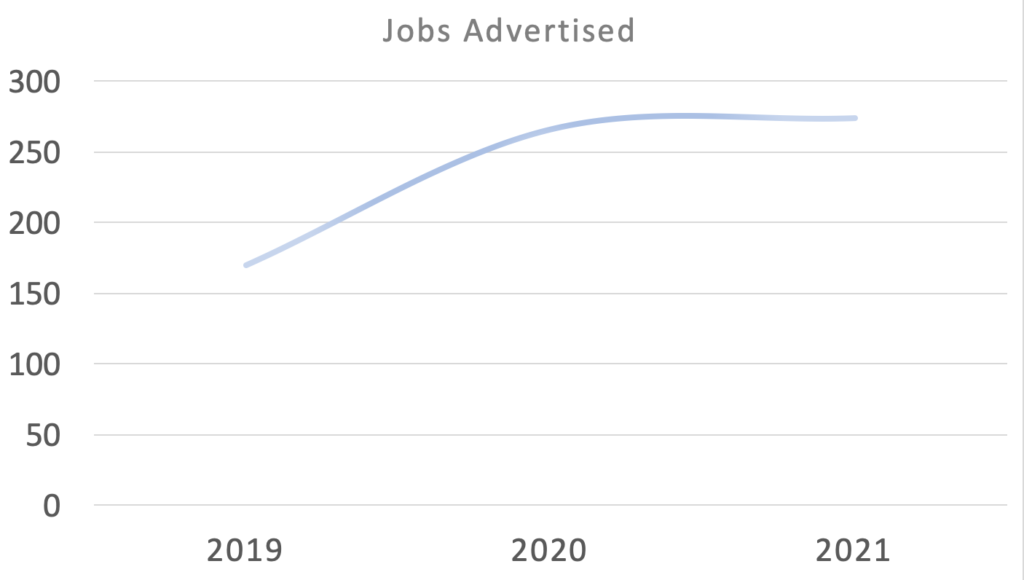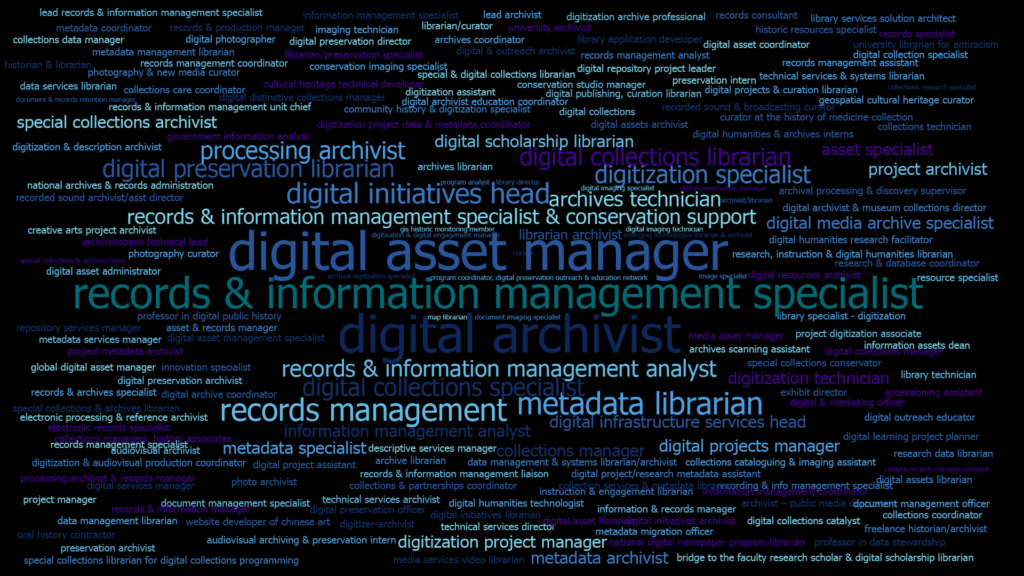A three-year analysis of jobs advertised on Twitter suggests that the pandemic increased demand for digital curation professionals, which has grown by almost two-thirds since 2019. Despite the maturity of the field–UMaine’s Digital Curation graduate program was launched in 2021–there still appears to be no consensus on what to call these positions, whose titles have ranged from the prosaic (Digital Archivist) to the esoteric (Emerging Data Practices Librarian).
There’s a running joke among professionals who care for digital data and collections that no two job titles are the same. It turns out this is only a slight exaggeration.

A study conducted by UMaine’s Digital Curation program uncovered several hundred titles with almost no overlap. The highest yearly percentage of total jobs with a single title was only 8%, attained by Digital Archivist in 2019. The trophy for Digital Curation Job Title of the Year in 2020 and 2021, however, went to Records & Information Management Specialist, with 5% and 4% of the tally respectively. The latter title was especially popular in government positions.
Overall the number of digital curation jobs advertised rose 61% from 2019 to 2021, with the biggest bump during the height of COVID-19.
 2019-21 growth in digital curation jobs advertised in tweets included in this study
2019-21 growth in digital curation jobs advertised in tweets included in this study
While their doors were shuttered in response to the pandemic, many libraries, archives, museums, labs, and private companies explored ways to engage their audience over the Internet, for example by digitizing analog collections or presenting born-digital material online. The amplified need for technical expertise, combined with an increasing reliance on remote work, may explain the surge in digital curation openings despite the contemporaneous loss of jobs in other sectors of the economy.
The proliferation of job titles is also staggering. The number of titles tracked in this study rose in step with the increase in openings, from 147 unique titles in 2019 to 274 in 2021–a 47% increase. A pie chart compiling the titles from 2021 shows a bewildering array of tiny slices, most corresponding to a single incidence of each title.
That said, industry standards seem to be coalescing somewhat. The proportion of unique titles among all jobs was 86% in 2019, but only 79% in 2021.
Titles ranged from the prosaic to the exotic. In 2021 39% of titles included the word “digital”; some made explicit reference to curation, as in Stanford’s opening for a Digital Curation Specialist. Many titles were slight variations on each other, like Digital Project/s Archivist/Assistant/Lead/Librarian/Manager/Specialist. Others were portmanteau titles, such as Curator/Archivist and Archivist-Librarian.
 2019-21 trends in Digital Curation job titles featured in 3 or more advertisements in the study data
2019-21 trends in Digital Curation job titles featured in 3 or more advertisements in the study data
Many titles seemed to be complete inventions, including Community & Partnerships Manager; Born Digital & Media Preservation Assistant; Collection Growth Specialist; and Discovery, Systems, & Digital Strategy Librarian. Cambridge’s Imperial War Museum sought a Still Media Digitization Technician, the first time that term for photography appeared in the data. The hands-down winner for most exotic title, however, has to go to Princeton’s Byzantine Numismatic Cataloguer & Linked-open-data Coordinator.
The range of employers was also impressive, from august institutions like the Library of Congress and Apple to more colorful establishments like the Surfing Heritage & Culture Center and the Hip Hop Collection of the Museum of Pop Culture.

To conduct this analysis, Digital Curation director Jon Ippolito harvested all tweets with the hashtags #DigitalCuration and #Job between 2019 and 2021 from accounts such as @archivesgig and @DigitCurator. The resulting 710 advertisements are certainly not all digital curation jobs, but presumably a representative sample.
All job tweets were normalized by removing prefixes such as Associate or Senior. Internships, even if paid, were excluded, as were tangential positions such as social media managers and web developers unless they were directly tied to managing or promoting a collection. Non-specific archivist and librarian titles were excluded unless the job description conveyed significant digital responsibilities; for example, in 2021 the video game company Blizzard Entertainment advertised a generic Archivist position.

Anyone interested in seeing these job announcements in real time can follow the official Twitter account of UMaine’s Digital Curation program. Researchers can access online the ranked data compiled by this study for 2019, 2020, or 2021.
Taught entirely online, UMaine’s graduate certificate in Digital Curation offers training to anyone who wants to work in museums, libraries, archives, laboratories, artist studios, or government offices. The program walks students through the phases of managing digitized or born-digital artifacts, including acquisition, representation, access, and preservation. More at DigitalCuration.UMaine.edu.

